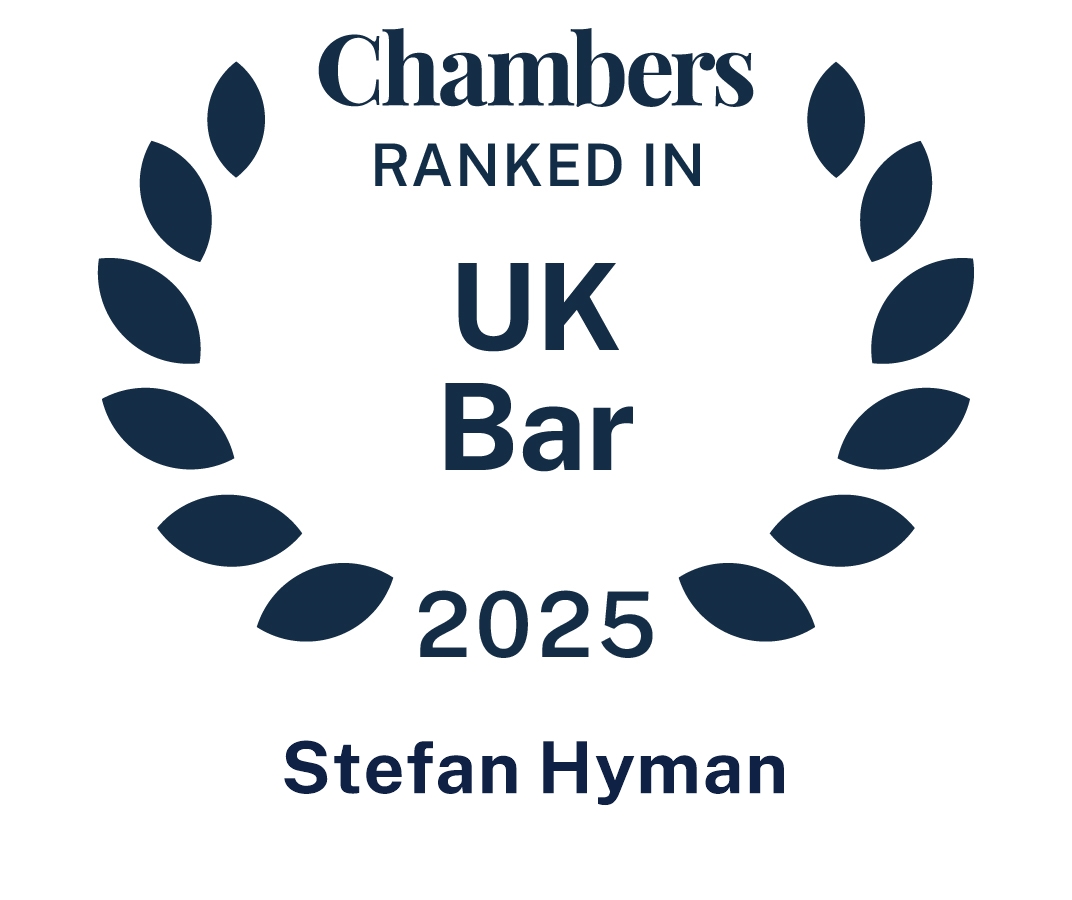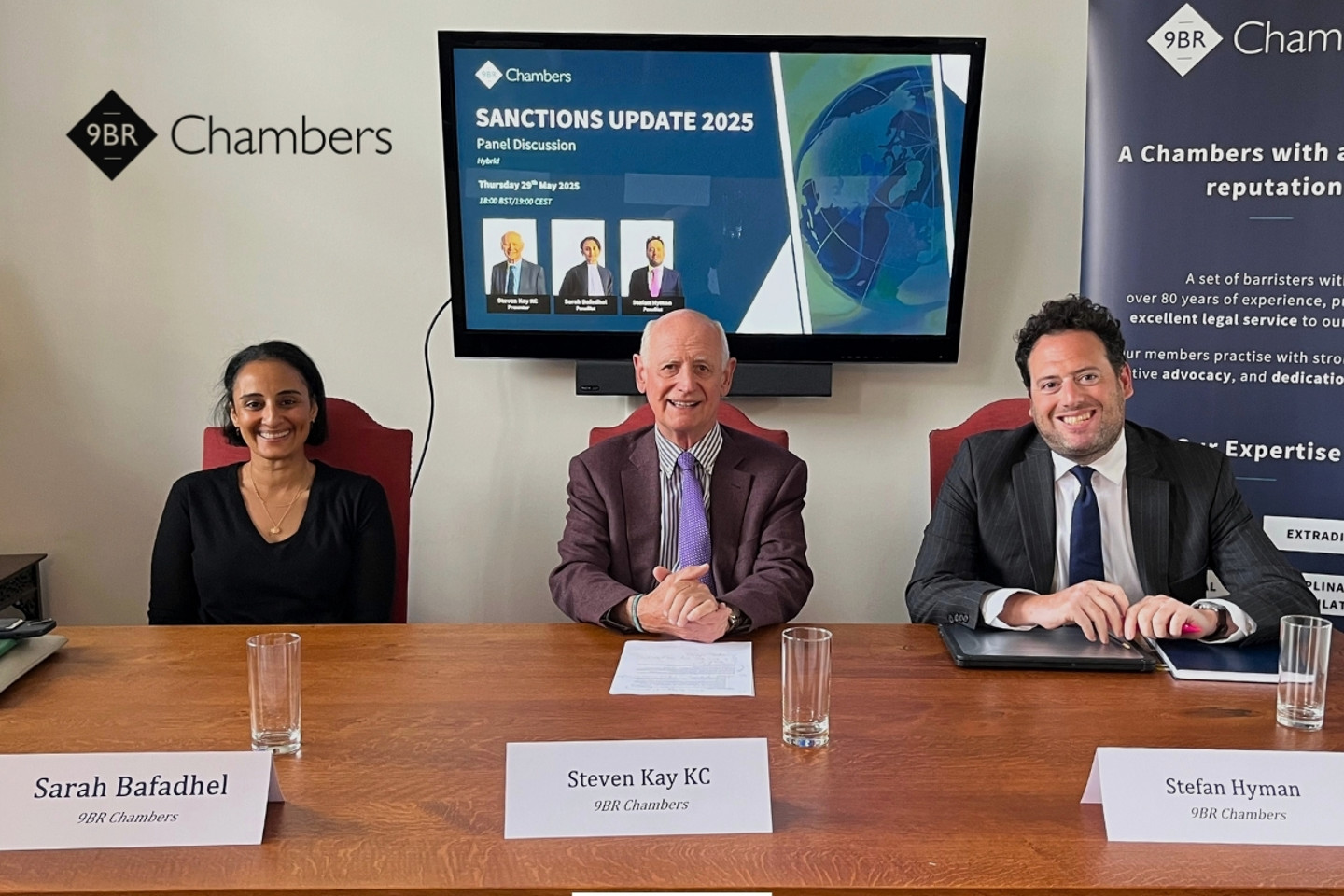Stefan’s practice comprises extradition & INTERPOL work, European criminal law, post-Brexit security cooperation, UK sanctions law and English criminal law.
Stefan sits on the Bar Council’s European Committee where he specialises in justice and security issues. He serves as a UK Delegate to the Council of Bars and Law Societies of Europe’s (CCBE) Criminal Law Committee.
Stefan is well-liked by solicitors and clients who value his easy manner and pragmatism. He is ranked in the Legal 500 as a Leading Junior in the field of International Crime and Extradition (2024), “He is imaginative and insightful and has a very energetic, charming court manner – judges like him”. He frequently publishes and gives seminars on extradition law and has contributed to official reports on the state of UK/EU security cooperation. He is qualified to represent members of the public directly in accordance with the Bar Council’s Direct Access Scheme.
Areas of Expertise
- Extradition & Interpol
Stefan represents parties at first instance and on appeal to the Administrative Court and UK Supreme Court. He is an expert at making technical challenges to extradition requests and advancing human rights arguments. As a fluent Spanish speaker, Stefan has particular interest in cases emanating from Spain and Latin America. Stefan has recent expertise in successfully defending Belgian, Cypriot and Greek cases and appearing for governments in Canadian, Swiss and US cases. Stefan is appointed to the CPS’ Extradition Panel at Level 3.
Stefan advises on ancillary matters to extradition, including sentence transfer, instructing a lawyer in the requesting state, alternatives to surrender, recognition of time spent on bail in the UK in the requesting state, and seeking withdrawal of domestic warrants/SIS II alerts. He assists those making applications to INTERPOL’s Commission for the Control of Files (CCF) to confirm what data INTERPOL holds and to seek correction or deletion thereof.
- EU criminal law
Stefan is an expert on the justice and law enforcement provisions in the UK/EU Trade and Co-operation Agreement 2020. He advises on matters including mutual legal assistance, criminal record exchange, Prüm and evidence admissibility. His expertise includes other EU justice and home affairs measures, including the European arrest warrant (EAW), the European investigation order (EIO), the European Public Prosecutor’s Office (EPPO) and procedural rights. As such, he is well-placed to advise on cross border investigations.
- UK sanctions law
Having been seconded to the Foreign, Commonwealth and Development Office’s (FCDO) sanctions legal team in 2023/4, Stefan will receive instructions on UK sanctions cases following his return to Chambers. His expertise includes the operation of autonomous and mixed regimes under the Sanctions and Anti-Money Laundering Act 2018 (SAMLA); making information requests, administrative reviews (section 23) and court reviews (section 38); implementation of UN sanctions in UK law; licensing under SAMLA, including the interaction between the UK, Crown Dependencies and Overseas Territories, and the nexus between UK and EU restrictive measures.
- UK criminal law
Stefan prosecutes and defends in the Crown Court receiving instructions in cases involving (dis)honesty, drugs, violence, fraud, and money laundering. He has an interest in evidential and jurisdictional issues and is well-versed in the disclosure regime under the Criminal Procedure and Investigations Act 1996 (CPIA). Stefan is appointed to the CPS’ General Crime (Level 2), Specialist Fraud (Level 2) and Special Crime (Level 2) panels.
Notable Cases
Evangelou v Chief Constable of the Sovereign Base Areas of Akrotiri and Dhekelia (Appeal to JR No. 1/2023)
It was not an abuse of process for the Chief Constable of the Sovereign Base Areas of Akrotiri and Dhekelia (SBAs) to return exhibits (dummy drugs packages) belonging to the Cyprus Police after the Resident Judge’s Court had refused the removal of the Interested Parties to Cyprus on foot of the forum bar. The forum bar does not confer an obligation on the SBAs to prosecute a defendant, nor a duty on Attorney General of Cyprus to halt its prosecution. The territorial effect of the Resident Judge’s Court is limited to the SBAs. The arrested persons had placed themselves within the jurisdiction of Cyprus.
Stefan was led by Helen Malcolm KC.
See the judgment here
Bertino v Public Prosecutor’s Office, Italy [2024] UKSC 9; [2024] 1 WLR 1483
To be deliberately absent from trial within the meaning of section 20(3) of the Extradition Act 2003, a requested person must have knowingly and intelligently waived his/her right to attend trial in person. This normally requires express notification of the date/place of trial and that it may proceed in absence. Only in extreme circumstances may a court find that a requested person who has not been so notified could have reasonably have foreseen the consequences of his/her conduct so that an extradition court may be sure of unequivocal waiver.
Read the judgment here
Merticariu v Judecatoria Arad, Romania [2024] UKSC 10; [2024] 1 WLR 1506
A right to a retrial within the meaning of section 20(5) of the Extradition Act 2003 confers an entitlement to receive a retrial in the requesting state and not an opportunity to apply for one. The only limitation to the entitlement may be procedural, such as a requirement to request within a specified time limit. The responses received to the requests for further information demonstrated that a judicial authority in Romania had a discretion to grant a retrial and therefore did not fulfil the requirements of section 20(5) of the Extradition Act 2003.
Read the judgment here
Paczkowski v Regional Court of Szczecin, Poland [2023] EWHC 1489 (Admin)
A party to appellate proceedings under the Extradition Act 2003 may reapply for the admission of evidence at an appeal hearing where a judge has refused the application on the papers. The admissibility of evidence is a substantive matter and not a case management decision. Under r.50.17 Crim PR, only case management decisions can be made on the papers.
Read the judgment here
Vascenkovs v Latvia [2023] EWHC 2830 (Admin)
Swift J considered whether Articles 597 and 613 of the UK-EU Trade and Co-operation Agreement 2020 (TCA) altered the post-Brexit approach to extradition by virtue of the newly created ‘principle of proportionality’. He disagreed with Sir Ross Cranston’s analysis in Dujka (see below). Swift J held that the TCA, as an unincorporated international treaty which proceeded section 21A of the Act, could not alter the approach thereto at common law. He concluded that the principles of mutual recognition and proportionate surrender are one and the same thing. Swift J certified a question of law of general public importance to the Supreme Court. Currently, a permission decision is awaited.
High Court
Dujka v Czech Republic [2023] EWHC 1842 (Admin)
After completing a sentence on a conviction Arrest warrant, the requested person was sought only in respect of a minor shoplifting offence. Sir Ross Cranston reconsidered the principle of proportionality under the UK-EU Trade and Co-operation Agreement 2020 focussing on Article 597 and the mechanism to seek/receive supplementary information on proportionality under Article 613.
Paczkowski v Regional Court in Szczecin, Poland [2023] EWHC 1482 (Admin)
Reconsideration of the principles concerning the admissibility of evidence on appeal where a party succeeds at first instance and seeks to introduce fresh evidence to buttress a district judge’s finding. The Court evaluated whether a party can ask a judge at an appeal hearing to rehear an application to admit fresh evidence where a single judge refuses it in a paper permission decision.
Ristin v Court of Timisoara, Romania [2022] EWHC 3163 (Admin)
Consideration of whether the first instance judge was correct to find that the requested person was a fugitive at common law. The Court concluded that a lack of a prohibition on a requested person from leaving the requesting state does not preclude a finding of fugitivity at common law.
Fedorowicz v Prosecutor General’s Office, Lithuania [2022] EWHC 3088 (Admin)
Analysis of extraterritorial dual criminality under section 64(4) EA in the context of section 45 of the Serious Crime Act 2015 in which Parliament incorporated the offence in Article 5 of the UN Convention on Transnational Organized Crime 2000 into UK law. To furnish a domestic court with jurisdiction to try a defendant, Fordham J held that a person must participate in some of an organised crime group’s activities in England & Wales; it was not enough that another member of the organised crime group participated in activities in England & Wales whilst the person’s own activities took place abroad.
Court of Appeal of Thessaloniki v Hysa and Others [2022] EWHC 2050 (Admin)
Successful defence of a CPS appeal against a District Judge’s decision to discharge three requested persons due to insufficient personal space at Thessaloniki (Diavata) Prison. All were released from extradition proceedings after the Greek authorities failed to answer the District Judge’s Aranyosi request. Four days afterwards, a document purporting to serve as an assurance was received. The CPS appealed. In its decision, the Court considered: (i) the ambit of judicial review versus a statutory appeal under section 26 or 28 EA where a ruling resulted in a final order; (ii) the standard of review when seeking to make “a collateral attack” on a case management decision which resulted in final order; (iii) the “relevant question” upon remittal under section 29(5) EA. Mark Summers KC led Stefan.
R (Salomon) v Westminster Magistrates’ Court [2022] EWHC 83 (Admin)
Evaluation of whether the High Court or an extradition judge at Westminster Magistrates’ Court can “reopen” consent where it is alleged that incorrect legal advice was given before an initial hearing. James Hines KC led Stefan.
ExtraditionNews
View allAchievements
- The Honourable Society of Lincoln's Inn
- The Criminal Bar Association
- Defence Extradition Lawyers' Forum
- European Criminal Bar Association
- UK Association for European Law
- CPS Extradition Panel (Grade 3)
- CPS Panel (Grade 2)
- CPS Fraud Panel (Grade 2)
- CPS Serious Crime Panel (Grade 2)
- European Committee, Bar Council
- CCBE Criminal Law Committee (UK Delegation)
- Crimeline (2025), Referrals for improper applications: a warning shot from the High Court
- Crimeline (2024), CJEU says EAW mutual trust and mutual recognition doesn’t apply to the UK anymore
- Crimeline (2024), Five take aways on Bertino and Merticariu
- Crimeline (2024), More trial in absence decisions from Luxembourg and a quick note on EPPO
- Crimeline (2023), The Rwanda cases and their impact on extradition/
- Crimeline (2023) & DELF Newsletter (2023), Two important EAW decisions and what they meant to us
- Crimeline (2022), Detention conditions and release mechanisms: the approach to countries outside the Council of Europe
- Crimeline (2022), Meanwhile in Europe…: a summary of the Court of Justice’s recent case law on the EAW
- Crimeline (2022), How to interpret the Extradition Act 2003? From compatible to conforming interpretation to incorporation
- Crimeline (2022), Appeals procedure in extradition cases
- Crimeline (2021), Marosan V Romania (2021) EWHC 3098 and an underlying theme: how to ascertain the EU law obligations of foreign courts
- DELF Newsletter (2021), Recent Developments in Appeal Procedure
- Crimeline (2021), Zabolotnyi in the Supreme Court: three takeaways and a look to the future
- Crimeline (2020), Extradition to the EU-27 under the UK/EU Trade and Cooperation Agreement: similarities and ten key differences (updated) (with Jonathan Swain)
- Crimeline (2020), Looking beyond the Transition Period: will there be surrender? (with Jonathan Swain)
- Honourable Society of Lincoln’s Inn, Buchan Prize for BPTC Result (2015).
- Honourable Society of Lincoln’s Inn, Lord Denning Scholarship for the BPTC (2014).
- Organization of American States, Best Participant in the Model OAS (2010).
- University of Edinburgh, Special Distinction in Spoken Spanish (2009)
- City Law School (2015), Bar Professional Training Course, Outstanding
- City Law School (2015), Graduate Diploma in Law, Commendation
- King’s College London (2010), MA in War Studies, Distinction
- University of Edinburgh (2009), MA (Hons.) in European History and Spanish, First-class with Honours









